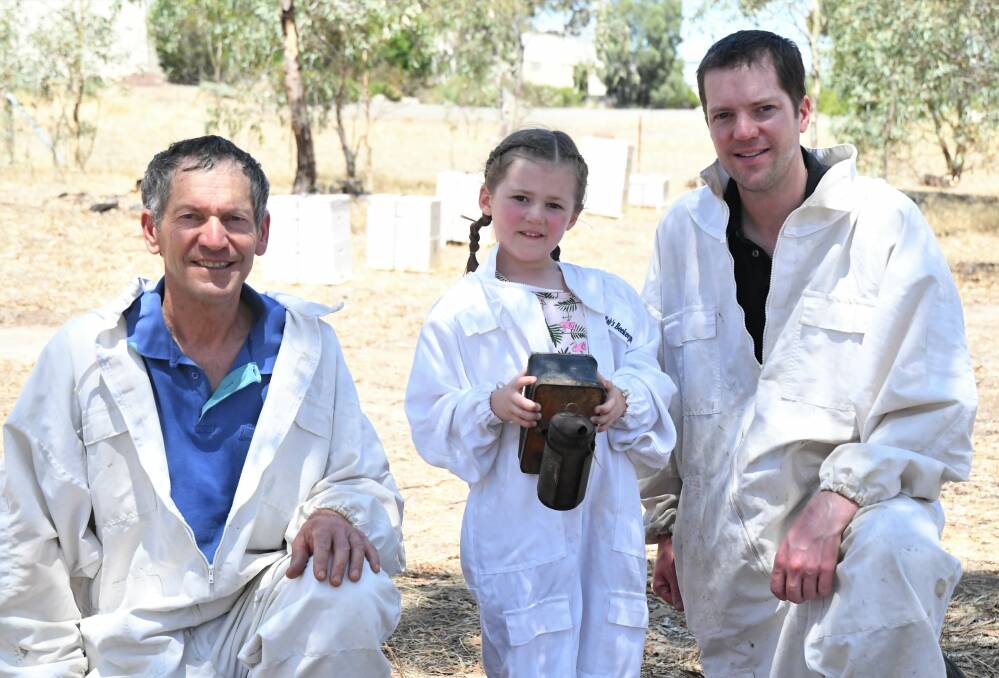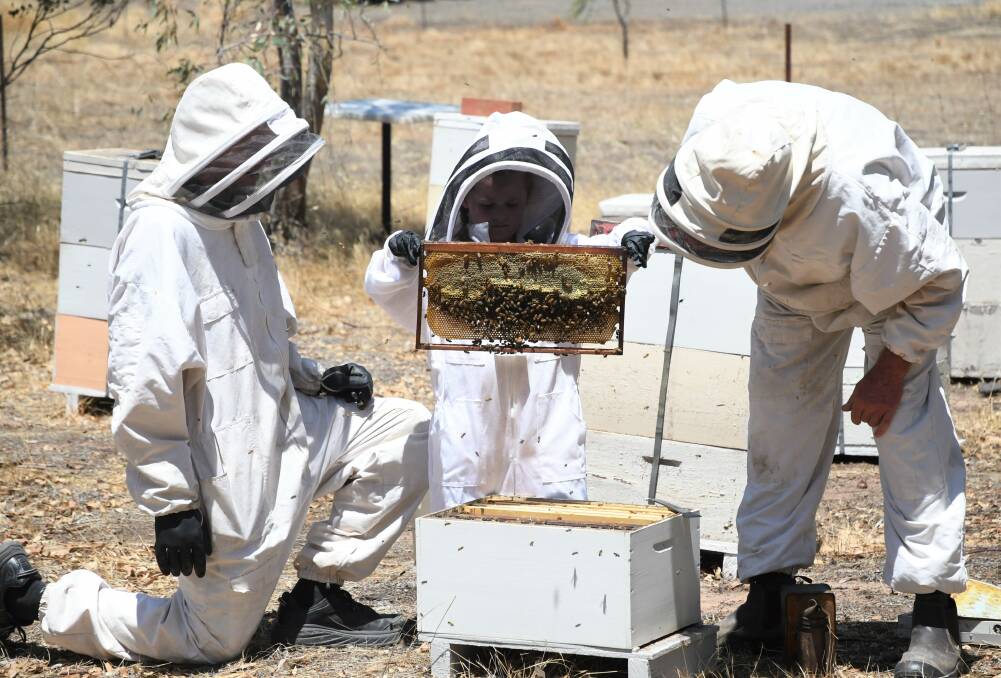
AT just five-years-old, Lucy Mathews could be the Wimmera's youngest beekeeper.
Subscribe now for unlimited access.
$0/
(min cost $0)
or signup to continue reading
The Prep student tends bees with her grandpa Andrew Mathews and dad Greg Mathews at the family-owned Grampians Olive Co. at Laharum.
The Mathews family has owned the olive grove since 2008. Home to about 28,000 olive trees, the grove boasts the title of being the largest family-owned, single estate and certified organic olive plantation in Australia.
Andrew said beekeeping had always been a passion for him.
"I've always had beekeeping as a hobby, ever since I was a kid. I was 13 or 14 when I got my first hive in my backyard," he said.
"My father had originally bought it and thought it would be good to make our own honey. None of my brothers were interested; once they got stung they said 'no thanks'. But I thought it was fascinating.
"They are such interesting creatures. It's amazing to see how clever they are and how they adapt to their environment."
What started as a hobby soon turned into a small business where he sold honey from his home through classified advertisements in newspapers.
"It got to the stage where I had between 80 and 100 hives which was just too many once I went to university. I couldn't pass my classes and tend to the bees," he said.
"I got rid of most them except one hive and had a break from it for a few years."
Andrew rekindled his passion five years ago when the olive grove installed its first hives and started producing organic honey.
"There are only 20 hives so it's not a big operation and still very much a hobby," he said.
"The number of hives depends each year and whether I get a swarm. We sell the honey at the shop with everything else because there's too much for us to use.
"They are Italian honeybees, which most commercial honey producers use as well. Our honey varies over the season because we don't move the hives.
"In the early spring they forage from the wildflowers that we get in the Grampains, then the olives come into flower so they forage on them.
"We also do native cut flowers which they get pollen from. They will also forage from the eucalyptus trees, so there's a lot around for them.
"Each extraction is different and the taste depends on what they get their pollen from."
Greg started learning beekeeping skills from his dad five years ago and said he was still learning.
"I got myself a beekeeping suit. When time allows, I enjoy helping dad and learning about them," he said.
"I think what makes our honey popular is that people can come meet the beekeeper and see how it's made."

Andrew said extraction could be done by one person, but was easier in a team. He had a very special helper for his last extraction in the form of his five-year-old granddaughter Lucy.
Lucy said she had helped spin honey in the past, but this was the first time she had helped her grandpa and dad with the extraction.
"I got a bee suit for my birthday," she said.
"I like helping with the bees because I like honey. Bees fly out of their hives and get nectar and pollen from flowers. They then make honey."
She said she wasn't scared of the bees.
The main honey-making time at the grove is in spring and summer. The grove's honey is not heat treated or filtered.
People should be concerned because bees are vital to pollinating lots of different crops... the future will look a bit bleak for a while.
- Andrew Mathews, Laharum beekeeper
"We will do four extractions this season, but some other years we might only get two; it just depends on how many flowers are around," Andrew said.
He wanted to encourage other people to keep bees - even just as a hobby.
"The more hives there are the better. People can learn about beekeeping skills through groups like Wimmera Beekeepers, which I'm a part of," he said.
"It's good to be part of the group especially for beginners. We learn a lot from each other. The group meets here for our monthly meetings, so if anyone is interested they can contact me (on 5383 8299)."
The group has 60 members who are from across the Wimmera, including Warracknabeal, Halls Gap and Nhill.
Grampians Olive Co. is located at 376 Olive Plantation Road, Laharum. It is open seven days a week from 11am to 4pm.
For more information about the grove, head to its website.
BUSHFIRE IMPACTS
THE Australian honey industry could take two decades to fully recover from the Australian bushfire crisis, according to the head of the industry association.
Pollination is worth $14 billion to the national economy and is vital to the billion-dollar almond industry which is Australia's largest horticultural export.
NSW Apiarists' Association president Stephen Targett said fire-affected forests were unlikely to produce nectar and pollen for years, or even decades, to come. He estimated that about 7000 hives had been lost across NSW.
Beekeepers have access to national parks in Victoria and Tasmania, but less access in Queensland and NSW.
Andrew said the grove's hives were impacted by the 2014 Grampians bushfires, however doubted its honey production would be impacted by this summer's fires.
"The 2014 fires did impact us for quite a number of years. It happened just as we started having bees so it was very light-on," he said.
"Now everything has recovered so we're doing alright. But the rest of industry is going to be doing very poorly.
"Some lost hives that burnt, but even the ones that didn't burn now don't have a lot of trees to forage on.
"Keeping those bees alive will be another issue all-together. The future will look a bit bleak for a while.
"People should be concerned because bees are vital to pollinating lots of different crops, particularly almonds - without bees you have no almonds. Without bees, food production goes down.
"It's not so much the supply of bees - that's something you can do easily if you have the nectar and pollen - but if you don't have that then numbers can't be built up."
While you're with us, you can now receive updates straight to your inbox twice weekly from the Wimmera Mail-Times. To make sure you're up-to-date with all the news from across the Wimmera, sign up below.


